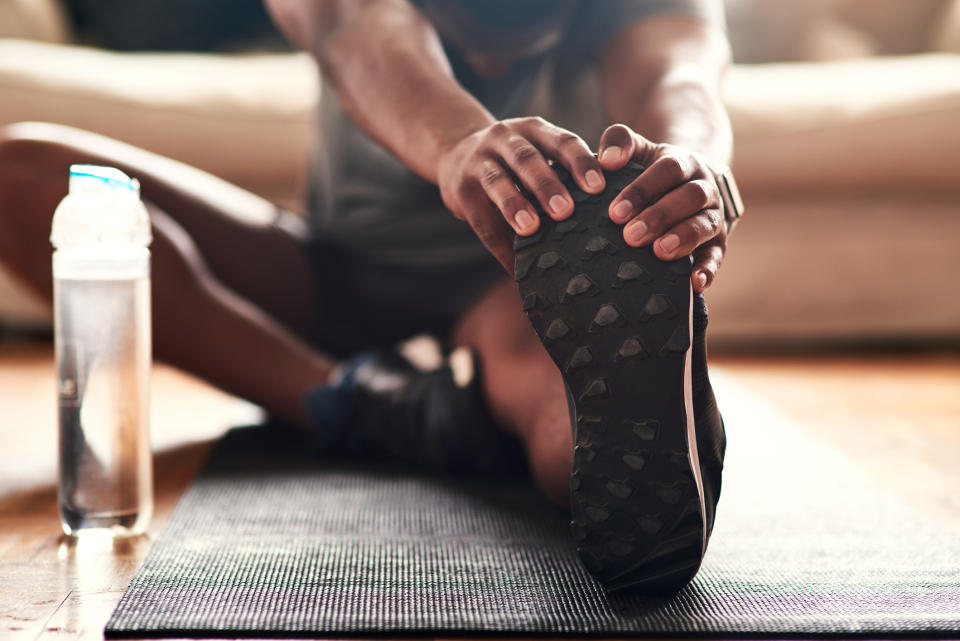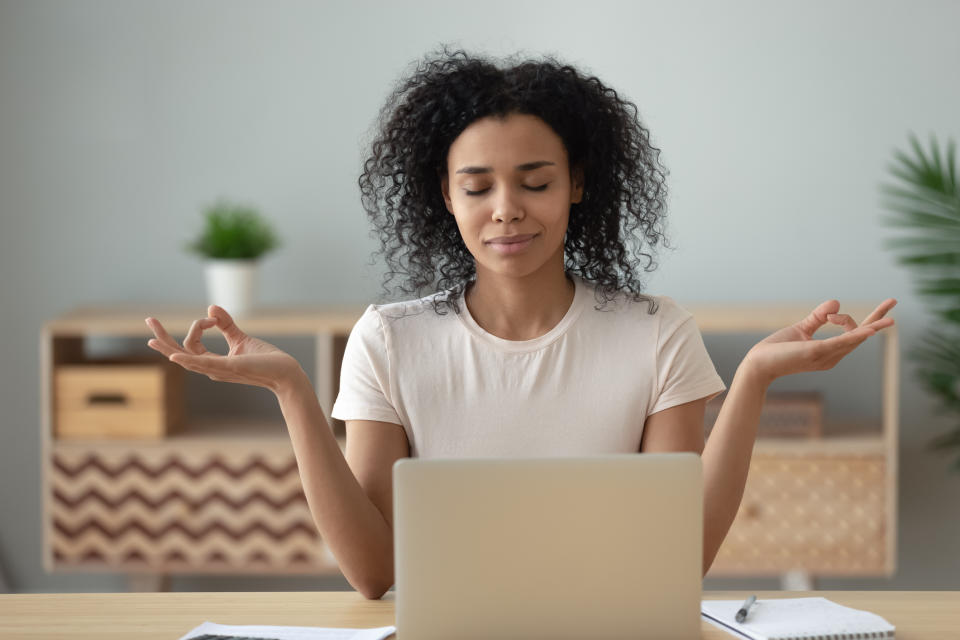How to cope with anxiety during the second lockdown, according to mental health experts

As England goes into lockdown for the second time, the thought of being cooped up for the next four weeks, or more, can have a very real impact on your mental wellbeing.
Sure we figured out some coping strategies during the first lockdown – some of which were more helpful than others (stocking on up on houseplants beat endless Zoom quizzes) – but for many, concerns about being isolated for another long stretch could well trigger stress, anxiety and low moods.
“The COVID-19 outbreak has inevitably caused a lot of uncertainty for all of us,” explains Niels Eék, psychologist and co-founder of mental health and self-development platform Remente.
“For those among us that regularly suffer from anxiety, the second lockdown will have only exacerbated these feelings, as our routines are once again disrupted and we are forced into isolation.
“Most commonly, concerns surrounding our own health, the unstable economy or the health of loved ones, are causing us to feel nervous and anxious.”
Depression and anxiety tripled among adults during the height of the first lockdown, according to a study published in the journal Psychosomatic Medicine.
The Office of National Statistics (ONS) also reported that following the first lockdown one in eight adults (12.9%) experienced moderate to severe depressive symptoms in June 2020.
Read more: The psychological impact of not having anything to look forward to
Mental health charity Mind has also warned of a “second, mental health pandemic” if nothing is done to support people mentally during the coronavirus pandemic.
Feeling anxious about returning to lockdown is a very “normal” reaction, according to Owen O’Kane, psychotherapist and author of Ten Times Happier.
But if you’re really concerned about how you’re going to cope during the second lockdown, it is important to reach out and get professional help. Speak to your GP or contact Mind for advice.
“When you experience adjustments to your life as a result of abnormal circumstances outside of your control, it will create a sense of unease and worry,” O’Kane explains.
“But the positive news is that you have a choice in how you respond and that’s what will make the difference.”
So what can you do to help manage feelings of anxiety and boost your mental wellbeing during lockdown 2.0?
Reframe your mindset
“Accept that the restrictions that you are facing have not been put in place to punish you, but to save you and many other people from a potentially deadly threat,” Eék advises. “Acknowledge that you cannot control the current situation; however, you can control your reaction to it.”
He says mindfulness and goal-setting can help manage how we react to, and feel about, the spread of COVID-19 and the subsequent need for lockdown.
“When setting yourself goals for the day, make sure you plan some social activities, such as a lunch date over Skype with family,” Eék adds.
Stick to a daily routine
Dr Paul McLaren, consultant psychiatrist at the Priory’s Hayes Grove Hospital says people need rhythm and pattern in their lives.
“To ease stress, take a step back and think about the usual pattern of your life pre-COVID,” he suggests. “How does it work when you’re at your most content?
“Break it down into its main elements and see if you can quantify them. For example, social time, family time, partner time, food, exercise and work. Then see how you can replicate that in lockdown.
“You will need to be proactive and organise your time. Socialising through video calls will never be as powerful as face-to-face, but it could produce some soothing.”
Read more: We miss colleagues more than we think during coronavirus lockdown

Take back control
Eék suggests trying to limit unwanted surprises.
“Constant notifications throughout the day on your device or computer can be a contributing factor to stress for many people,” he says.
“Taking a moment to step away from our devices can be extremely beneficial for our mental health.”
Eék adds that when feeling anxious it can help to disconnect from the news and focus on what is within your control. One way to do this is through journaling.
“There are so many benefits to journaling: doing so can act as an outlet for processing emotions and journaling on an ongoing basis can help to increase self-awareness,” he explains.
Watch: What is stress eating and how can it impact you?
Get moving
Eék says regular physical activity can help produce mood-boosting hormones called endorphins.
“Unlike the first lockdown, the newly amended lockdown restrictions this time stipulate that there is no limit to the amount of time we can spend exercising, whether it be at home or outdoors,” he says.
“Exercising regularly can make you feel more energetic, alert, and happy. It can also help to promote good sleep patterns.”
Question your thoughts
Our mind can play tricks on us when we are anxious, and our thinking can become distorted, according to Alison Hardy, a cognitive behavioural therapist at the Priory’s Hospital in Chelmsford.
“For example, an abrupt work email may lead you to think that you have made a mistake, or a friend failing to return a text may lead you to think that they are not thinking of you,” she explains.
“Before you accept the thought, which will undoubtedly fuel your anxiety, ask yourself is that anxious thought a ‘fact or an opinion?’ If it is an opinion, you may be getting anxious for nothing.”

Read more: Missing the 'cuddle hormone': How lockdown has impacted friendships
Embrace the ‘joy of missing out’ (JOMO)
Eék says that those of us who usually suffer from “fear of missing out”, commonly known as FOMO, and have a tendency to take on too much without giving ourselves enough time to recuperate, might actually be enjoying the pause their body and mind were craving.
“In these instances, do not feel bad for taking this time to slow down, re-centre, catch up with yourself and find a new balance within a slower, quieter routine,” he advises.
Channel your inner lockdown expert
This time around you have the experience of surviving the first lockdown and it can help to draw on this, says O’Kane. “Concentrate on what was helpful for you,” he suggests. “Reflect on what activities, actions and interactions worked best for you.
“Likewise, if there were aspects of the first lockdown that you found challenging, then consider what you will do differently this time round. It’s worth focusing on what resilience you have now developed, and go forward confidently knowing that whatever comes, you’ll handle it.”
Accept your anxiety
Anxiety, although uncomfortable, is a normal emotion, says Hardy.
“Accepting anxiety, and the way things are at the moment, can be just like accepting that sometimes we feel angry, or sometimes we feel sad and sometimes we feel happy, and just like those other emotions, anxiety will pass,” she explains.
“However, if your anxiety is long-term and really affecting your day-to-day life you should always seek professional support.”
Read more: Male suicide rate highest for 20 years: How to help if someone is struggling
Stay connected
As human beings we are hard-wired to connect. “Living ‘locked away’ is not a natural, healthy state, regardless of your personality type,” explains O’Kane.
He suggests connecting to others in whatever way is possible for you, telephone, email, Zoom or even writing letters.
“Disconnection increases anxiety and impacts negatively on mood so be mindful of connecting to someone every day,” he continues.
“If you have neighbours who are alone or isolated try to engage with them, even if it’s a chat through the window. A smile or a kind gesture can change someone’s life. We need each other more than ever.”

Breathe yourself calmer
According to Hardy, breathing deeply can help the body settle down to its more natural equilibrium. “It is useful to imagine you are blowing up a balloon of your favourite colour,” she says.
“Take a deep breath in and notice how your stomach rises as you inhale which allows your lungs to take in maximum air, then let a long, slow breath out as if you are filling your balloon with air, and do this three times.”
Remember lockdown will pass
O’Kane suggests we repeat the mantra, ‘This will pass’ several times each day. “All tough periods in life eventually pass, as will this pandemic,” he says.
“Try to focus on the resolutions that are around the corner: vaccines, better testing, and improved treatment protocols.
“Allow yourself to think of some of the things you are looking forward to when this is over. Hope is everything is darker times. You may be in lockdown, but you have a choice in the freedom you create in your mind.
“See you on the other side.”
If you are concerned about your mental health, contact your GP or you can refer yourself directly to an NHS psychological therapies service (IAPT) without a referral from a GP.
For more information about anxiety and depression visit mental health charity Mind or call its helpline on: 0300 123 3393.




